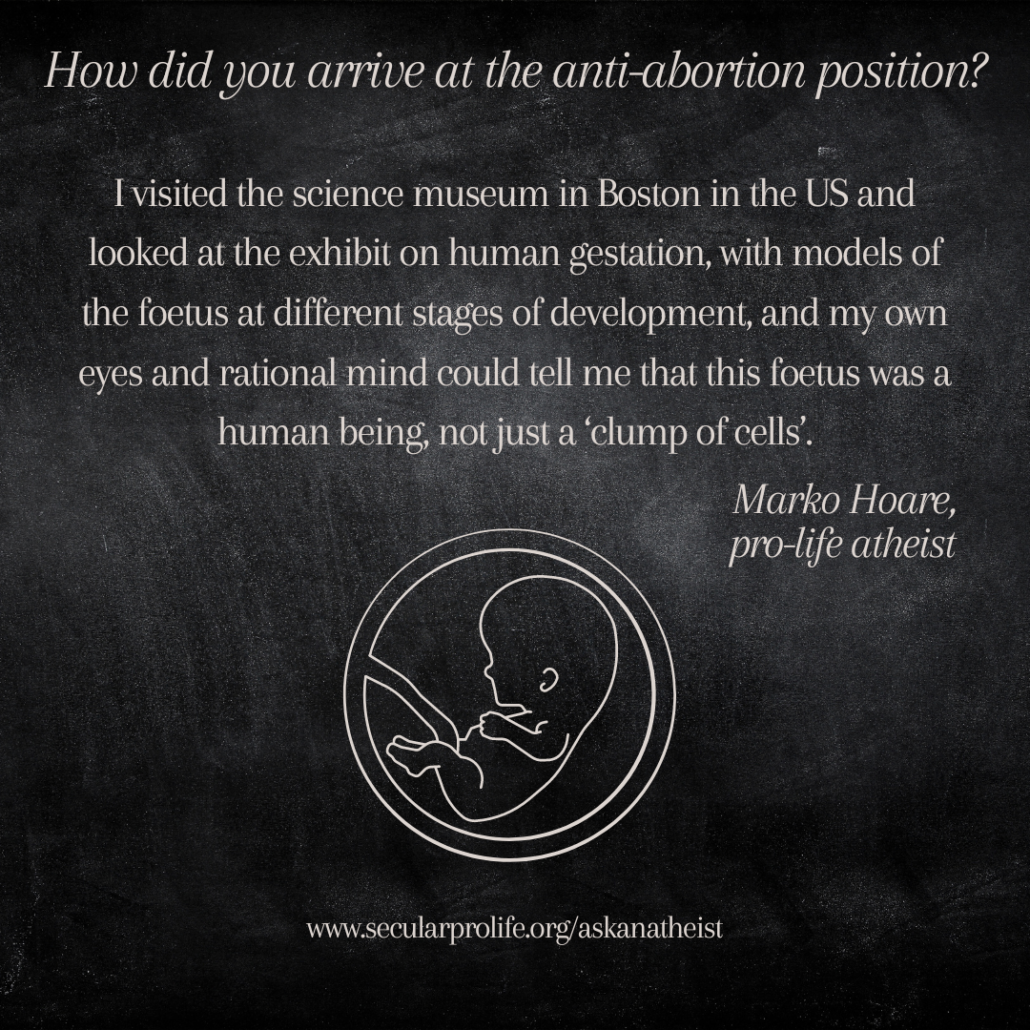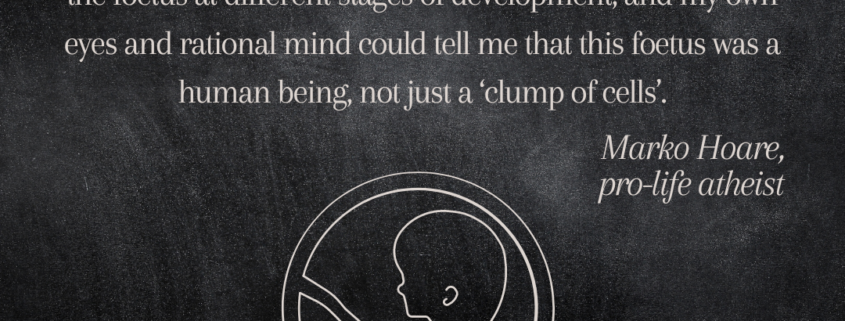Ask a Pro-Life Atheist: Marko Hoare
Once a month or so, the Secular Pro-Life blog features a short interview with a pro-life atheist. (See the full series of interviews here.) Although Secular Pro-Life is not exclusively for atheists, historically atheists have played a key role in the organization. As atheists become more prominent in the pro-life movement generally, we’re excited for the opportunity to share their stories. This month, we welcome atheist Marko Hoare.
How did you arrive at the anti-abortion position?
I arrived at the pro-life position gradually, over many years; so slowly that I did not realise it was happening until my conversion was completely heartfelt.
I grew up in a very left-wing family living in liberal London, where the pro-abortion worldview was absolutely hegemonic. For years, being pro-abortion was not something I seriously questioned, because supporting abortion seemed inseparable from the overall ‘progressive’ worldview. But at the back of my mind, I instinctively felt there was something morally problematic about abortion, and I occasionally debated the issue with myself.
Then, more than twenty years ago, when I was in my late twenties, my long-term girlfriend became pregnant with twins, and she wanted to have an abortion. I respected her choice. We returned from the clinic absolutely devastated; she was in tears. I felt overwhelmingly that something terrible had just happened; as if a hole had been torn in the moral universe. After we eventually split up, she told me that complications from the operation meant she could no longer have children.
After that, I had two long-term girlfriends in a row who were pro-life—neither of them very or at all religious—and they both tried to convince me that abortion was wrong.
I visited the science museum in Boston in the US and looked at the exhibit on human gestation, with models of the foetus at different stages of development, and my own eyes and rational mind could tell me that this foetus was a human being, not just a ‘clump of cells’. I returned home to the UK and admitted to my pro-life girlfriend that she was right about abortion, but although I was beginning to think so rationally, I still did not really feel it.

The final stage in my conversion was having my own children; seeing the 12-week pregnancy scan of my first baby and listening to his heartbeat; it was obvious, both rationally and emotionally, that he was a baby. The idea of him being aborted, his entire future erased, seemed terrifying to me.
Later, when I looked at my first two babies as they lay on the grass in the summer, I thought of the children I and others had lost to abortion, who would never be able to lie on the grass in the summer with their parents, surrounded by love. Some babies get the sunshine and the love; others get the abortionist’s knife. It took me many years of life experience before I understood how wrong this was.
How did you arrive at the atheist position?
My parents are both atheists. My mother’s parents were both atheists. My father’s parents were not very religious; his mother called herself a ‘sceptic’. There was never any reason or possibility for me to be anything other than an atheist, and I’ve never wavered, for so much as a moment, in my certainty that there is no God. It is the rationalist position. But becoming pro-life has led me to have much greater respect for religion, particularly for Catholicism, and for religious believers in general.
How do you contribute to the cause of saving lives in the womb?
I have donated money to several pro-life campaigns and charities, and written pro-life opinion pieces. Ideally, I would like to do more.
What words of wisdom do you have to share?
The more you investigate the history and reality of pro-abortion politics, the darker they become: their inseparability from eugenics, racial engineering, racism, anti-disability prejudice and elitist hatred of the lower classes; the horrific brutality of the abortion procedure inflicted on defenceless babies, and the terrible permanent injuries that babies that survive abortion will have to live with; the social and economic pressure on women to abort—particularly poor vulnerable women, or those pregnant with the ‘wrong’ kind of baby; the mass extermination of people with disabilities behind the fig-leaf of ‘choice’; the exploitation of the corpses of aborted babies in research by the pharmaceutical and medical industries; the way the culture of consequence-free, obligation-free sex encourages sexual harassment and assault. The mass violence of systematically exterminating millions of unwanted babies worldwide every year is essentially similar to the acts of mass violence perpetrated by colonial or totalitarian regimes.
The civilisational wrong-turn the West made when it embraced institutionalised abortion is at the heart of its current decline; its aging populations and selfish, small-minded ethos. The damage to our society and its values has been incalculable; we have ditched the social obligations of parents to care for all the children they create without discrimination, for men to care for the women they impregnate and for society to support pregnant women and mothers, and replaced them with the sterile, consumerist mantra of ‘choice’.
The pro-life case is morally, rationally and scientifically overwhelming. The abortion lobby is only able to maintain its ideological hegemony through relentless intimidation and demonisation of pro-lifers, silencing them and shutting down the debate, while it relies on buzzwords and euphemisms (‘choice’, ‘reproductive rights’, ‘women’s healthcare’, etc.) to conceal its true nature and the weakness of its case.
In the face of all this aggression and propaganda, we pro-lifers must always remember that right is overwhelmingly on our side, but that the overthrow of a deeply entrenched injustice is rarely quick or easy.



